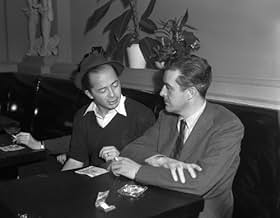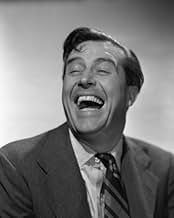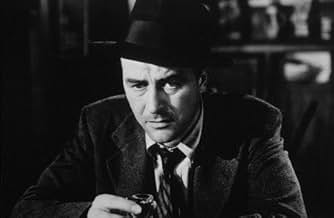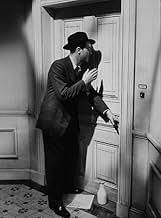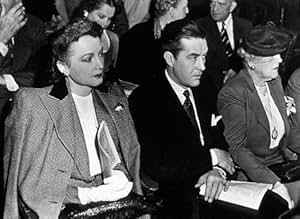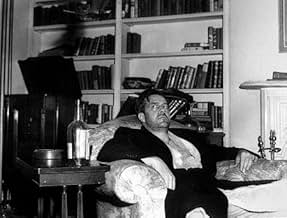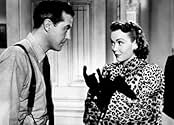NOTE IMDb
7,9/10
42 k
MA NOTE
La vie désespérée d'un alcoolique chronique au cours d'une beuverie de quatre jours.La vie désespérée d'un alcoolique chronique au cours d'une beuverie de quatre jours.La vie désespérée d'un alcoolique chronique au cours d'une beuverie de quatre jours.
- Réalisation
- Scénario
- Casting principal
- Récompensé par 4 Oscars
- 18 victoires et 3 nominations au total
Anita Sharp-Bolster
- Mrs. Foley
- (as Anita Bolster)
Andy Andrews
- Alcoholic
- (non crédité)
Gene Ashley
- Male Nurse
- (non crédité)
Walter Baldwin
- Man from Albany
- (non crédité)
Harry Barris
- Pianist at Harry & Joe's
- (non crédité)
Ian Begg
- Undetermined Secondary Role
- (non crédité)
Eddie Borden
- Drunk in Alcoholic Ward
- (non crédité)
Jess Lee Brooks
- Hospital Patient
- (non crédité)
Résumé
Reviewers say 'The Lost Weekend' is a groundbreaking film with a realistic portrayal of alcoholism. Ray Milland's performance as Don Birnam is praised for its depth. Billy Wilder's direction and the film's visual style, including deep focus and Miklós Rózsa's haunting score, effectively convey addiction's despair. However, some find it melodramatic and repetitive, with an unrealistic ending. Despite criticisms, it is regarded as powerful and influential in cinema.
Avis à la une
In 1968, I was just 22 years old and driving a taxi part-time in Ft. Lee, New Jersey. One day, I drove Charles Jackson (author of "The Lost Weekend") from Englewood Cliffs, NJ to a run-down hotel in Times Square, New York City. I had seen and really liked the movie of the same name, starring Ray Milland, who did a wonderful job portraying an alcoholic on a weekend binge. The film was so realistic, I had a strong feeling that Charles Jackson had written the book based on his own life. I got up the nerve to ask him, and he told me that....yes, he indeed was the alcoholic portrayed in his book. We talked quite a bit about his life on the way into Times Square. He seemed like a very nice person, although he seemed quite depressed. However, it still came as quite a shock when, shortly after having him in my cab, I read in the papers that he had hung himself in his hotel room in NYC. That's an experience I will never forget!
The often stated belief that alcoholism is a mere bodily addiction does not do the truth any justice. Alcoholism is more. It's a state of mind. It's addictive escapism for those who feel cheated by life, a way of avoiding fears and unhappiness, an illusionary method to make up for ones failures. Maybe that's why most therapies do not succeed. They solely concentrate on the illness, rather than on the cause of it. Of course, in many cases the cause cannot be helped...
In The Lost Weekend we accompany the failed writer Don Birnam (Ray Milland) surrendering to the self-destructive nature of his addiction. Despite being good-looking and intelligent, Don is a hopeless alcoholic filled with self-loathing ("The reason is me. What I am. Or rather what I am not.") The brand doesn't matter, the cheaper the better to him it's all the same. Drinking seems to be his only way to escape from his misery and low self-esteem. "Suddenly I'm above the ordinary. I'm competent. I'm walking a tightrope over Niagara Falls. I'm one of the great ones. I'm Michaelangelo, molding the beard of Moses. I'm Van Gogh painting pure sunlight. [...]" That's what a drunk Don tells his favourite barkeeper Nat (Howard Da Silva).
Yet, in one aspect he is lucky. Unlike many of his fellow sufferers he is not alone. After years of abuse, his faithful girlfriend Helen (Jane Wyman) and his brother Wick (Phillip Terry) have still not deserted him. Compassionately they do their utmost to protect Don from himself by keeping him under close observation. With great effort they determined the most inventive hiding-places of his bottles and they even visited nearby liquor stores and bars, begging not to accept Don as a customer. There is nothing they haven't tried, but Don appears to be beyond salvation ("I am not a drinker. I'm a drunk." he tells them.). Just before the three of them are about to go on a weekend trip, Don devises a cunning plan to temporarily get rid of the two persons who care about him, giving him time to acquire the liquid he treasures the most. Soon he is stone drunk, staggering through the streets, always on the lookout for the next drink. For Don there will be no weekend trip. Only the bottle and the desperate humiliations connected with attaining it.
The Lost Weekend is a a drama of great emotional vehemence, lacking the light heartedness of Billy Wilder's later works. It gives unclouded insight into the darkest corners of alcoholism and depicts the powerlessness of the alcoholic over himself. Wilder created great controversy at that time by letting the lead actor succumb to his addiction. He didn't shy away from showing the addict's humiliations when begging for money or booze. Neither did he hesitate to point out the addict's loss of all self-respect when stealing and lying to pay for his one need. The horrifying hallucination scene only adds up to the disturbing decline of Don Birnam's humanity, proving that the greatest horrors lie within our imagination.
This is an excellent film of lasting relevance. It is technically brilliant and shines with great dialogue (which is typical for Wilder). Its storytelling (flashbacks) is superior. Furthermore Ray Millard (Dial M for Murder) gives a terrific and equally courageous performance as the the self-destructive alcoholic. You can see the desperate self-loathing and calculating slyness of a true addict written on his face.
In the end it comes down to two choices. Don can give in to alcoholism and thereby give up on life. Or he can try to overcome his addiction and face his fears and discontentment. Although sheer will-power may not be enough to achieve the latter, it is essential for succeeding. And the cause isn't lost, for there is Helen to help and care for him. Don is not alone. May someone have mercy on those who are...
In The Lost Weekend we accompany the failed writer Don Birnam (Ray Milland) surrendering to the self-destructive nature of his addiction. Despite being good-looking and intelligent, Don is a hopeless alcoholic filled with self-loathing ("The reason is me. What I am. Or rather what I am not.") The brand doesn't matter, the cheaper the better to him it's all the same. Drinking seems to be his only way to escape from his misery and low self-esteem. "Suddenly I'm above the ordinary. I'm competent. I'm walking a tightrope over Niagara Falls. I'm one of the great ones. I'm Michaelangelo, molding the beard of Moses. I'm Van Gogh painting pure sunlight. [...]" That's what a drunk Don tells his favourite barkeeper Nat (Howard Da Silva).
Yet, in one aspect he is lucky. Unlike many of his fellow sufferers he is not alone. After years of abuse, his faithful girlfriend Helen (Jane Wyman) and his brother Wick (Phillip Terry) have still not deserted him. Compassionately they do their utmost to protect Don from himself by keeping him under close observation. With great effort they determined the most inventive hiding-places of his bottles and they even visited nearby liquor stores and bars, begging not to accept Don as a customer. There is nothing they haven't tried, but Don appears to be beyond salvation ("I am not a drinker. I'm a drunk." he tells them.). Just before the three of them are about to go on a weekend trip, Don devises a cunning plan to temporarily get rid of the two persons who care about him, giving him time to acquire the liquid he treasures the most. Soon he is stone drunk, staggering through the streets, always on the lookout for the next drink. For Don there will be no weekend trip. Only the bottle and the desperate humiliations connected with attaining it.
The Lost Weekend is a a drama of great emotional vehemence, lacking the light heartedness of Billy Wilder's later works. It gives unclouded insight into the darkest corners of alcoholism and depicts the powerlessness of the alcoholic over himself. Wilder created great controversy at that time by letting the lead actor succumb to his addiction. He didn't shy away from showing the addict's humiliations when begging for money or booze. Neither did he hesitate to point out the addict's loss of all self-respect when stealing and lying to pay for his one need. The horrifying hallucination scene only adds up to the disturbing decline of Don Birnam's humanity, proving that the greatest horrors lie within our imagination.
This is an excellent film of lasting relevance. It is technically brilliant and shines with great dialogue (which is typical for Wilder). Its storytelling (flashbacks) is superior. Furthermore Ray Millard (Dial M for Murder) gives a terrific and equally courageous performance as the the self-destructive alcoholic. You can see the desperate self-loathing and calculating slyness of a true addict written on his face.
In the end it comes down to two choices. Don can give in to alcoholism and thereby give up on life. Or he can try to overcome his addiction and face his fears and discontentment. Although sheer will-power may not be enough to achieve the latter, it is essential for succeeding. And the cause isn't lost, for there is Helen to help and care for him. Don is not alone. May someone have mercy on those who are...
The script and score are superb and the acting flawless. Ray Milland is riveting in the role of a man who is as consumed by alcohol as it is consuming him. He lives and breathes for it and all around him become secondary including his long suffering girlfriend.
There is always a girl like this in the life of a good looking useless purposeless alcoholic kept afloat by either a wife or other family member, in this case a brother who pays the bills and tries to sober him up and dry him out periodically.
The score is relentless and highly avant Gard for its time, featuring music normally backing sci-fi flicks. Some of the scenes are profoundly frightening, his stay in the drunk tank with a sadistic feminine male nurse outlining all the horrors that await him and his DTs which feature a bat biting the head off a bird.
Very well done. I felt the ending was a little too pat, that would be my only fault with this.
9 out of 10. Excellent.
There is always a girl like this in the life of a good looking useless purposeless alcoholic kept afloat by either a wife or other family member, in this case a brother who pays the bills and tries to sober him up and dry him out periodically.
The score is relentless and highly avant Gard for its time, featuring music normally backing sci-fi flicks. Some of the scenes are profoundly frightening, his stay in the drunk tank with a sadistic feminine male nurse outlining all the horrors that await him and his DTs which feature a bat biting the head off a bird.
Very well done. I felt the ending was a little too pat, that would be my only fault with this.
9 out of 10. Excellent.
Uncompromising, dark and definitely disturbing Best Picture Oscar winner from 1945 that deals with a writer's (Ray Milland in one of the very best performances ever shown on the silver which deservedly landed him his only Oscar) alcoholism and the effects that his problem has on himself, his work and those closest to him. The love of his life (Jane Wyman) and his very supportive brother (Phillip Terry) try to save Milland from a habit that has gotten terribly out-of-hand. Heart-wrenching flashbacks into Milland's demise are sometimes difficult sequences to get through. In the end it is not a sure thing if Milland can distance himself from his disease and return to a normal life. Billy Wilder's uncompromising direction and screenplay yielded him Oscars in this film that scared many studios away in the early-1940s due to its intense subject matter and the question of whether the film could create interest. Made during a time when patriotic movies and romantic comedic farces dominated the cinema, "The Lost Weekend" was truly unlike anything ever experienced before. A very well-made production that is first class all the way. A real classic in every sense of the term. 5 stars out of 5.
As a recovering alcoholic (14 years sober) this remains as the first great film dealing with alcoholism. Ray Milland"s great performance shows realistically the insanity of drinking and the struggles. The promises and hidden bottles will ring true to anyone who has dealt with the problem. Billy Wilder's career was noted for his comedies but he showed in "Lost Weekend" that he knew how to deal with serious matter as well. The ending shot is a classic and will be memorable for anyone seeing the film. Check out "Days of Wine & Roses" as well.
Oscars Best Picture Winners, Ranked
Oscars Best Picture Winners, Ranked
See the complete list of Oscars Best Picture winners, ranked by IMDb ratings.
Le saviez-vous
- AnecdotesBilly Wilder claimed the liquor industry offered Paramount Pictures $5 million not to release the film; he also suggested that he would have accepted had they offered it to him personally.
- GaffesWhen the waiter gives Don the check at Harry & Joe's and he reaches for it, the glass, ashtray, napkin, and cigarette all change position between camera shots.
- Citations
[Nat moves to wipe away the circle of whisky from Don Birnam's glass]
Don Birnam: Don't wipe it away, Nat. Let me have my little vicious circle. You know, the circle is the perfect geometric figure. No end, no beginning.
- ConnexionsEdited into Les cadavres ne portent pas de costard (1982)
- Bandes originalesLa Traviata
(1853) (uncredited)
Music by Giuseppe Verdi
Libretto by Francesco Maria Piave
Libiamo ne' lieti calici (Drinking Song) Performed by John Garris and Theodora Lynch with The San Francisco Opera Company
Meilleurs choix
Connectez-vous pour évaluer et suivre la liste de favoris afin de recevoir des recommandations personnalisées
Détails
- Date de sortie
- Pays d’origine
- Langue
- Aussi connu sous le nom de
- Días sin huella
- Lieux de tournage
- Société de production
- Voir plus de crédits d'entreprise sur IMDbPro
Box-office
- Budget
- 1 250 000 $US (estimé)
- Montant brut mondial
- 813 $US
- Durée1 heure 41 minutes
- Couleur
- Rapport de forme
- 1.37 : 1
Contribuer à cette page
Suggérer une modification ou ajouter du contenu manquant



